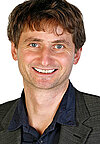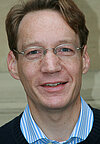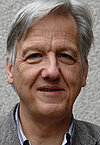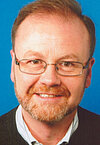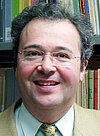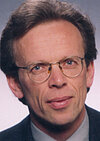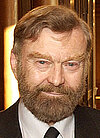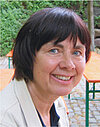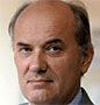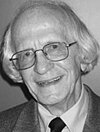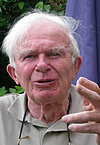Leibniz Laureates
The Gottfried Wilhelm Leibniz Awards are sometimes called the "German Nobel Prizes", as no other science award in the Federal Republic is endowed with comparable amounts of money. Laureates may receive up to 2.5 million euros. The German Research Foundation (DFG) awards the prizes every year to ten pre-eminent scientists.
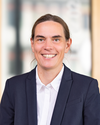
2022: Prof. Dr. Claudia Höbartner: Organic Chemistry I
Chemistry professor Claudia Höbartner is being honoured for her outstanding research on the nucleic acids DNA and RNA: She receives the prestigious Leibniz prize endowed with 2.5 million euros. Claudia Höbartner's research focuses on the catalytic functions of the nucleic acids DNA and RNA. The two biomolecules can not only store, transport and regulate genetic information. They are also able to mediate the course of biochemical reactions like enzymes. Such RNA enzymes are called ribozymes and can be found in the laboratory by artificial evolution. The professor has made groundbreaking discoveries in this field. Höbartner and her team developed the first RNA enzyme that makes a very specific modification to another RNA molecule, and they recently also uncovered the chemical mechanism of this new reaction. In addition, together with colleagues from Göttingen, she clarified the spatial structure of a DNA enzyme down to the atomic detail for the first time. This work proved that DNA also folds into complex three-dimensional shapes in order to be catalytically active – just as protein enzymes do. More..
On Wednesday, July 5, 2023, Prof. Höbartner was additionally awarded the Bavarian Order of Merit for her services.
2017: Prof. Dr. Jörg Vogel, Infection Biology
The researcher studies small regulatory RNA molecules of bacterial pathogens. He and his team are determined to get to the bottom of how these molecules work and act. His work could show new ways to fight pathogens. Vogel is one of the world's leading researchers in the field of RNA biology. He detected the importance of RNA biochemistry very early on. Moreover, he has done pioneering work in the field of RNA analysis with the application and development of high-throughput sequencing methods.
2016: Prof. Dr. Dag Nikolaus Hasse, History of Philosophy
The research focus of Dag Nikolaus Hasse is on Arabic history of philosophy and science and on the Arabic influence in Europe from a historical point of view. Hasse also focuses on the European history of philosophy and science from the 12th to 16th century as well as Medieval Latin literature. The Leibniz Prize now enables Hasse to press ahead with his research activities. Since 2013, Hasse has been head of the large-scale project "Ptolemaeus Arabus et Latinus" of the Bavarian Academy of Sciences. One of the project's goals is to gain new insight into the common bases of Islamic and European culture in the Middle Ages.
2014: Prof. Dr. Laurens Molenkamp, Physics
Physicist Laurens Molenkamp is considered one of the fathers of semiconductor spintronics. This technology is expected to help make information processing and computer technology even more efficient. Molenkamp was the first scientist in the world who managed to experimentally realize topological insulators, a novel class of materials that has been the object of intensive research ever since and is expected to be the key to further progress in the field of spintronics: Topological insulators should lead the way towards even smaller and more powerful microchips.
2009: Prof. Dr. Holger Braunschweig, Chemistry
The expert on Inorganic Chemistry works in the fields of Metallic and Elemental Chemistry. He focuses on investigating transition metal complexes with boron-centered ligands. His studies, in which he literally "tamed" the element of boron by compounding it with metals, are considered groundbreaking achievements. In doing so his team has created new molecules and given them new properties. It is expected that these new molecules will significantly influence catalysis and the Materials Sciences.
2001: Prof. Dr. Ulrich Konrad, Musicology
Ulrich Konrad has held the Chair of Musicology at the Julius-Maximilians-Universität Würzburg since 1998. According to the DFG, his studies are informed by his wide range of his interests: "As a Mozart scholar, who achieved a fresh reconstruction of Mozart's approach to his work on the basis of more than 300 musical sketches, he has made a name for himself all over the world. Additionally, he is a dedicated student of composers and compositions of the 19th century." In the field of Recent Music History, his subjects of interest include Richard Strauß, Franz Schmidt, and Alban Berg.
1999: Prof. Dr. Martin Lohse, Pharmacology
Lohse, who has held the Chair of Pharmacology and Toxicology at the Julius-Maximilians-Universität Würzburg since 1993, studies receptors for hormones and vectors of the nervous system. These receptors recognize and bind messenger substances and trigger reactions in the cell. With their aid, for instance, adrenaline accelerates the heartbeat, or insulin increases sugar absorption. Receptors also are a preferred point of application for medicinal drugs.
1990: Prof. Dr. Bert Hölldobler, Zoology
The expert on the sociobiology of insects has published groundbreaking studies, particularly on the social behavior and the ethoecology of ants. He investigates the social life of these animals both in natural ecosystems and in laboratory experiments. In 1969, Hölldobler went to Harvard University where he and his colleague Edward O. Wilson wrote the textbook "The Ants," which earned them the Pulitzer Prize in 1991. In 1989, he returned to the Julius-Maximilians-Universität Würzburg and held the Chair of Zoology II until 2004.
1987: Prof. Dr. Hans-Peter Zenner, Ear, Nose, and Throat Medicine
The physician Hans-Peter Zenner worked at the University ENT Clinic in the Kopfklinikum of the University of Würzburg from 1976 to 1988. During this time, he discovered the surprising motility of sensory cells of the inner ear, which is an essential cell biological basis of speech and music processing. Today, the study of sensory cell motility forms the cornerstone of the German early diagnostic program of infantile hearing loss and deafness already a few days after birth. In 1988, Zenner accepted an appointment to the chair of otolaryngology at the University of Tübingen.
1986: Prof. Dr. Otto Ludwig Lange (†), Botany/Ecology
Professor emeritus today, Lange held the Chair of Botany II of the Julius-Maximilians-Universität Würzburg from 1963 until his retirement in 1992. He is one of the founding fathers of Phytophysiological Ecology. His main field of study is the ecophysiology of lichens, cyanobacteria, algae, and mosses.
1986: Prof. Dr. Ulrich Heber (†), Botany/Physiology
Heber was Professor of Botany at the Julius-Maximilians-Universität Würzburg from 1971 up to his retirement in 1996. His major fields of investigation included the biochemistry of stress in plants (freezing resistance, water balance, and air pollutants, such as sulfur dioxide or ozone).


